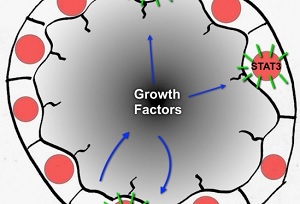 |
| Renal cyst fluid contains growth factors that cause the excessive proliferation and cyst growth associated with polycystic kidney disease.--Courtesy of UCSD |
Researchers from UC Santa Barbara have developed a method by which to deliver antibodies to the kidney and curb a specific type of cyst growth that gives rise to polycystic kidney disease, which is inherited and has no known cure.
UCSB's Thomas Weimbs has deployed the antibody immunoglobin-G, which binds to specific proteins and growth factors in the kidney to inhibit cyst growth. But the problem with this treatment in the past is that the antibody can't penetrate the wall of a cyst that is already present, and it can't inhibit the proteins therein. To get past the cyst wall, Weimbs' team used immunoglobin-A, which can cross a cell layer by bonding to polymeric immunoglobin receptors, work that Weimbs had done in the past while conducting postdoctoral research at UC San Francisco.
"I put one and one together," Weimbs said in a statement. "I thought if STAT6 is highly active in polycystic kidneys, maybe it also expresses a lot of pIgR--and that turned out to be the case. So we tested this in mouse models and in human polycystic kidney tissues, and, in both cases, high levels of pIgR were expressed in kidney cysts."
In mice, the immunoglobin-A remained inside the cyst at a rate of 7% while getting a ride from the receptors. Once in there, the cysts are thought to hold them because they "don't have an exit," according to Weimbs.
The team published its results in the Journal of Biological Chemistry.
"Our strategy allows for the repurposing of thousands of existing monoclonal antibodies that have already been developed, which opens up a whole new class of therapeutics not previously used for PKD therapy," Weimbs concluded. "This paper is proof of concept that we can use IgA to target polycystic kidneys. The next hurdle will be proof of therapeutic efficacy where we actually take an IgA antibody targeted to a specific protein or growth factor and see if it can inhibit cyst growth."
- here's the UCSD report